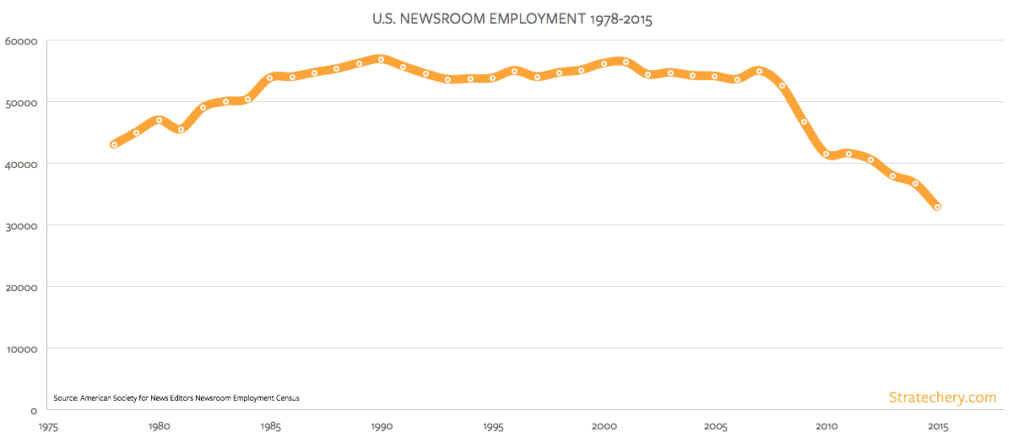From Stratechery, Oct. 19:
The IT Era and the Internet Revolution
I like to say that I write about media generally and journalism specifically because the industry is a canary in the coal mine when it comes to the impact of the Internet: text shifted from newsprint to the web seamlessly, completely upending the industry’s business model along the way.
Of course I have a vested interest in this shift: for better or worse I, by virtue of making my living on Stratechery, am a member of the media, and it would be disingenuous to pretend that my opinions aren’t shaped by the fact I have a personal stake in the matter. Today, though, and somewhat reluctantly, I am not just acknowledging my interests but explicitly putting Stratechery forward as an example of just how misguided the conventional wisdom is about the Internet’s long-term impact on society, in ways that extend far beyond newspapers (but per my point, let’s start there).
What Killed Newspapers
On Monday Jack Shafer, the current dean of media critics, asked What If the Newspaper Industry Made a Colossal Mistake?:
What if, in the mad dash two decades ago to repurpose and extend editorial content onto the Web, editors and publishers made a colossal business blunder that wasted hundreds of millions of dollars? What if the industry should have stuck with its strengths — the print editions where the vast majority of their readers still reside and where the overwhelming majority of advertising and subscription revenue come from — instead of chasing the online chimera?That’s the contrarian conclusion I drew from a new paper written by H. Iris Chyi and Ori Tenenboim of the University of Texas and published this summer in Journalism Practice. Buttressed by copious mounds of data and a rigorous, sustained argument, the paper cracks open the watchworks of the newspaper industry to make a convincing case that the tech-heavy Web strategy pursued by most papers has been a bust. The key to the newspaper future might reside in its past and not in smartphones, iPads and VR. “Digital first,” the authors claim, has been a losing proposition for most newspapers.Shafer’s theory is that the online editions of newspapers is inferior to print editions; ergo, people read them less. To buttress his point Shafer cites statistics showing that most local residents don’t read their local newspaper online.
The flaw in this reasoning should be obvious to any long-time Stratechery reader: people in the pre-Internet era didn’t read local newspapers because holding an unwieldy ink-staining piece of flimsy newsprint was particularly enjoyable; people read local newspapers because it was the only option. And, by extension, people don’t avoid local newspapers’ websites because the reading experience sucks — although that is true — they don’t even think to visit them because there are far better ways to occupy their finite attention.
Moreover, while some of those alternatives are distractions like games or social networking, any given newspaper’s real competitors are other newspapers and online-only news sites. When I was growing up in Wisconsin I could get the Wisconsin State Journal in my mailbox or I could go to a bookstore to buy the New York Times; it didn’t matter if the latter was “better”, it was too inconvenient for most. Now, though, the only inconvenience is tapping a different app. Of course most readers don’t even bother to do that: they just click on whatever is in their Facebook feed, interspersed with advertisements that are both more targeted and more measurable than newspaper advertisements ever were.
The truth is there is no one to blame for the demise of newspapers — not Google or Facebook, and not 1990s era publishers. The entire linchpin of the newspaper business model was controlling distribution, and when that linchpin was obliterated by the Internet it was inevitable that the entire apparatus would collapse.
The IT Era
Make no mistake, this sucks for journalists in particular; newsroom employment has plummeted over the last decade:
Still, just for a moment set aside those disappearing jobs and look at what happened from roughly 1985 to 2007: at a time when newspaper revenue continued to grow jobs didn’t grow at all; naturally, newspaper companies were enjoying record profits.
What had happened was information technology: copy could be made on computers, passed on to editors via local area networks, then laid out digitally. It was a massive efficiency improvement over typewriters, halftone negatives, and literal cutting-and-pasting:...MUCH MORE
